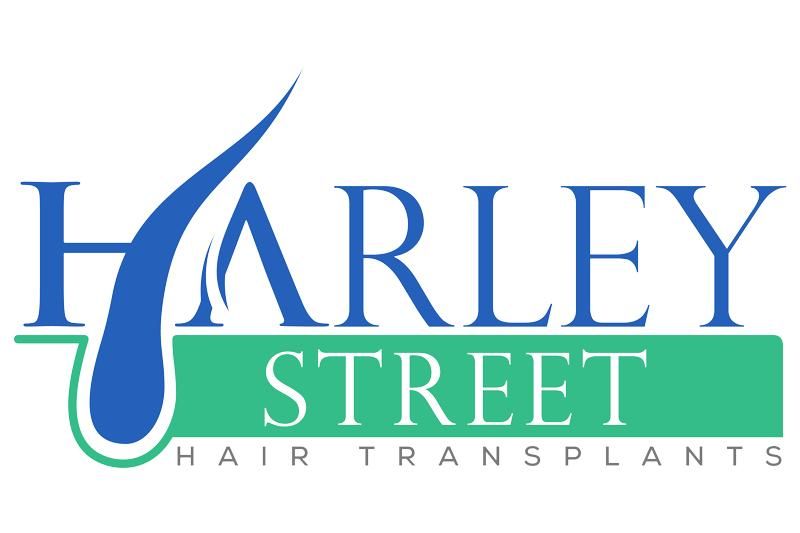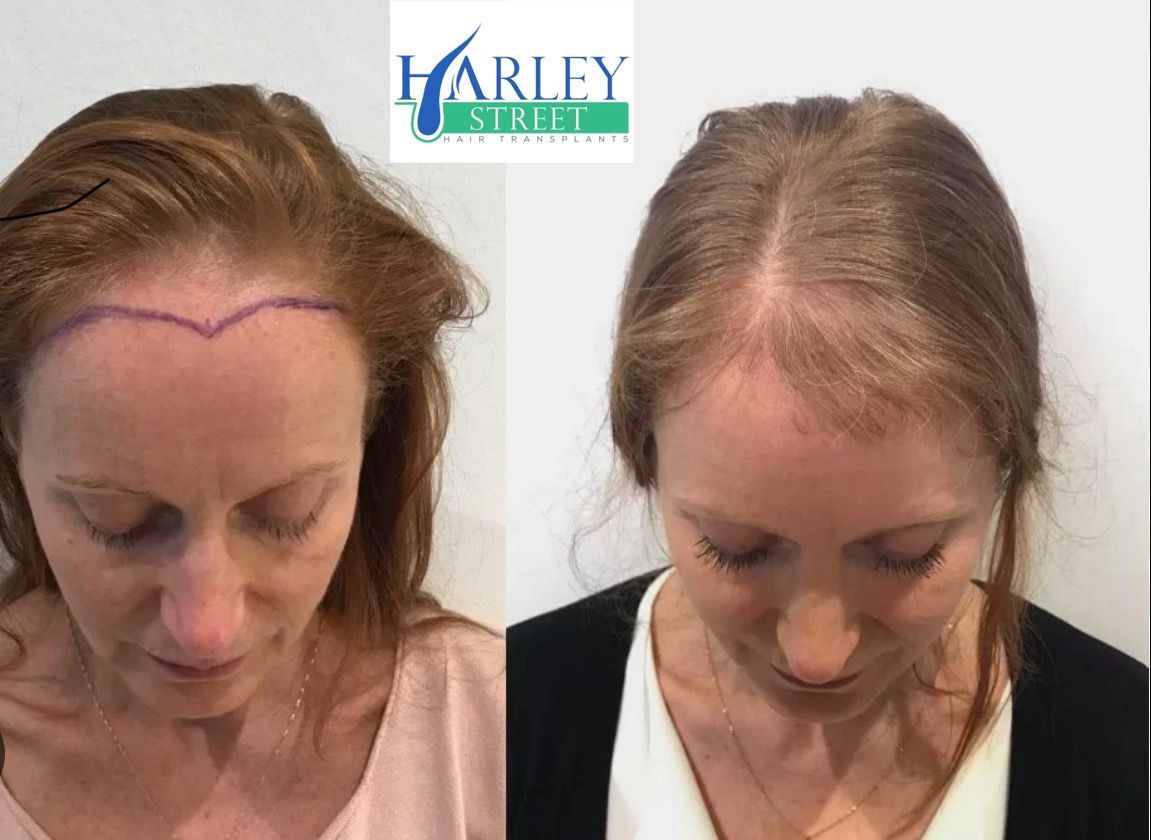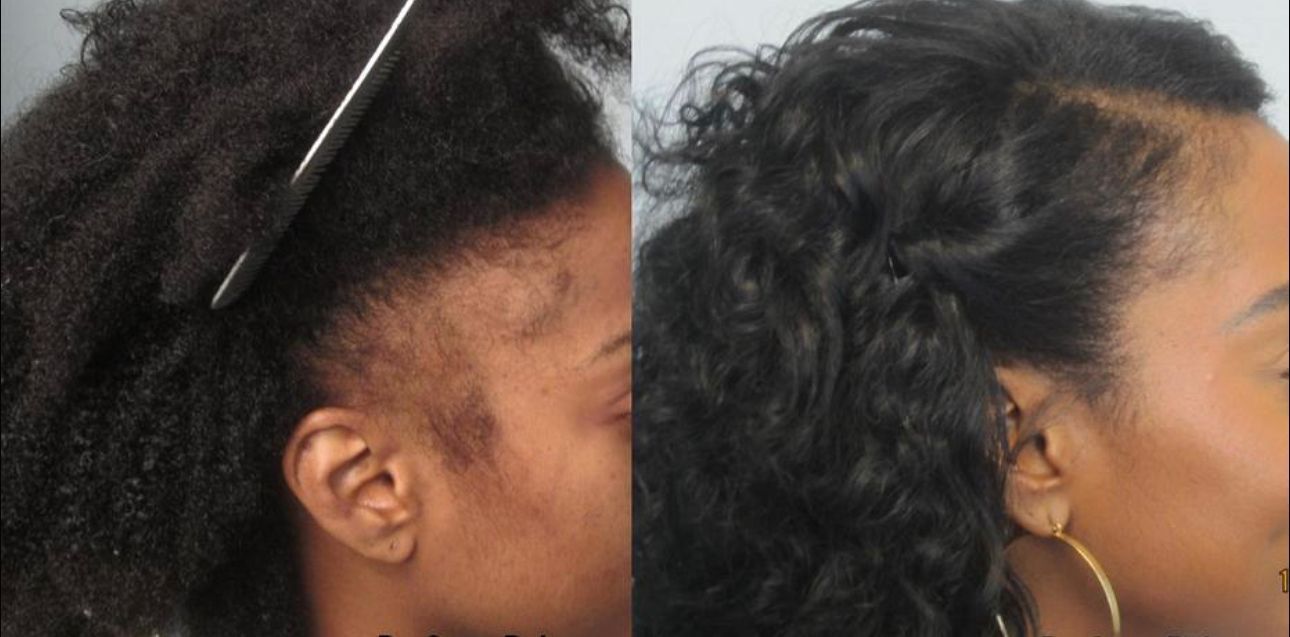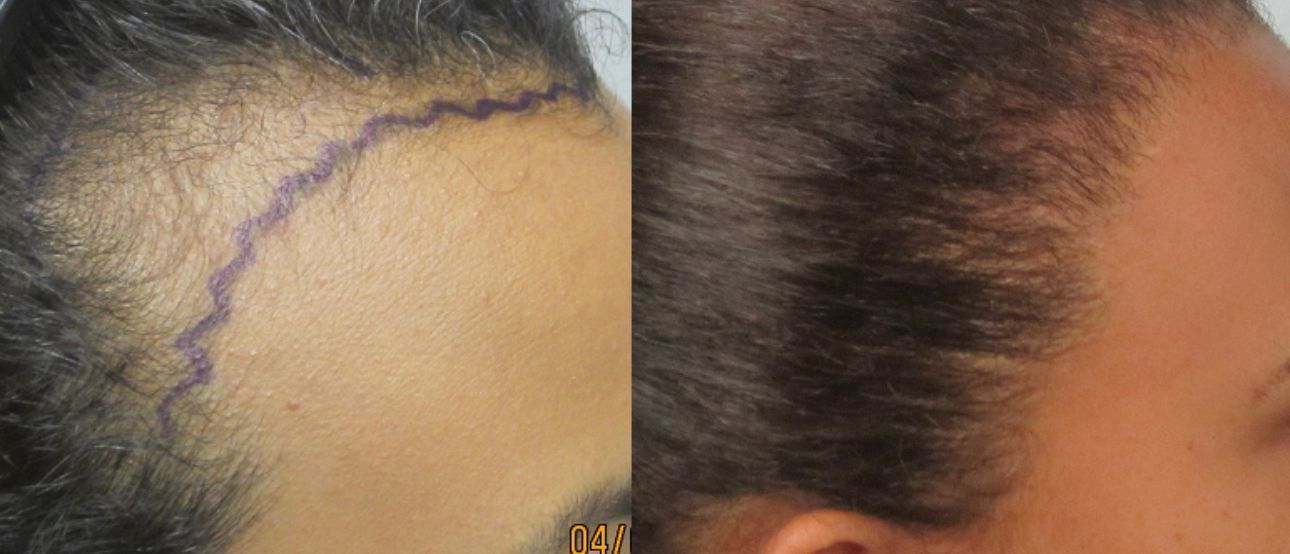Female Hair Transplants in Newcastle
Welcome to Harley Street Hair Transplant Newcastle, where we offer first class female hair transplant services in Newcastle! We understand how hair loss can impact one's self-confidence and self-esteem, and we're here to help you achieve the look you desire.
Our team of experienced and skilled hair transplant specialists is dedicated to providing the highest quality of care to our clients. We use the latest techniques and technologies to ensure that your hair transplant procedure is safe, effective, and minimally invasive.
Whether you're experiencing hair loss due to genetics, hormonal changes, or other factors, our team can help. We offer a range of options for female hair transplants, including FUE (follicular unit extraction) and FUT (follicular unit transplantation).
During your initial consultation, our team will evaluate your hair loss and discuss the best options for achieving your desired results. We will work with you to develop a personalised treatment plan that takes into account your unique needs and goals.
Our state-of-the-art facility is designed to provide a comfortable and relaxing environment for your hair transplant procedure. We use the latest technology and techniques to ensure that your transplant is successful and that you are satisfied with the results.
If you're interested in learning more about our female hair transplant services in Newcastle, please don't hesitate to contact us. We look forward to helping you achieve the look you desire and restoring your self-confidence!
Our range of female Hair Transplants
FUE
The Follicular Unit Extraction (FUE) technique is a viable hair transplant option for women who are dealing with hair loss or thinning. This method involves removing individual hair follicles from the scalp's donor area and transplanting them to the area experiencing hair loss or thinning. FUE is minimally invasive and doesn't create a linear scar, which is an appealing factor for women who prefer short haircuts. Whether you want to restore hair density to your entire scalp or address specific areas of thinning, FUE can be tailored to meet your needs.
FUT
For women experiencing hair loss or thinning, Follicular Unit Transplantation (FUT) can be a viable hair transplant technique. This procedure involves extracting a strip of hair-bearing skin from the donor area of the scalp and dividing it into individual follicular units to be transplanted to the affected area. However, one disadvantage of FUT is that it creates a linear scar that may be noticeable if the hair is cut short. FUT is commonly used for restoring hair density to more extensive areas of the scalp and may be combined with other hair restoration methods for optimal results.
Non Surgical Hair Loss Treatments
Women experiencing hair loss or thinning can benefit from Non-Surgical Hair Restoration treatments. This technique involves injecting a concentrated solution of the patient's platelets into the scalp, which contains growth factors that promote hair growth. Non-surgical hair restoration can stimulate hair growth in areas of thinning and improve the hair's overall quality and texture. It's a minimally invasive treatment that requires no downtime and can be used alone or in conjunction with other hair restoration methods for better outcomes.
Eyebrow Hair Transplants
Women who have experienced hair loss or thinning in their eyebrows can opt for Eyebrow Hair Transplants, a procedure that can help restore fuller and more natural-looking eyebrows. During the procedure, hair follicles are extracted from the donor area of the scalp and transplanted to the eyebrow region. We tailor our eyebrow hair transplants to suit each patient's unique needs and objectives, and the results are durable. Collaborating with one of our skilled and experienced hair transplant surgeons is crucial to achieving the best outcome and reducing the risk of complications.
Afro Hair Transplants
Our hair loss surgeons are skilled in treating patients with Afro-textured hair. Afro Hair Transplants for women involve moving hair follicles from the donor area, typically located at the back or sides of the scalp, to the recipient area, usually at the front or top of the scalp, to enhance hair density and restore hair loss. Performing the procedure requires specialised skills and techniques to appropriately transplant the thick, curly hair unique to Afro-textured hair.
Planning for a Hair Transplant?
Planning for a hair transplant is an important step towards achieving your desired look. Before undergoing the procedure, it is important to consult with a qualified hair transplant surgeon to discuss your expectations, assess your suitability for the procedure, and create a personalised treatment plan. Our surgeons will evaluate your hair loss pattern, hair density, and donor area to determine the number of hair grafts needed and the best technique for your individual needs. Additionally, we will provide you with pre-operative instructions, such as avoiding blood-thinning medication and smoking, and post-operative care instructions to ensure a smooth recovery. It is important to follow these instructions carefully to optimise the success of the hair transplant procedure. With careful planning and the guidance of our skilled hair transplant surgeons, you can achieve natural-looking and long-lasting results from your hair transplant procedure.
Book Your
Free Consultation Today
Contact Us
Our range of
Hair Loss Treatments
Patient Care Is Our Leading Priority

Follicular Unit Extraction (FUE)
FUE is a minimally invasive procedure that does not require a large incision or stitches, resulting in minimal scarring and a faster recovery time.

Follicular Unit Transplantation (FUT)
FUT can be an effective hair restoration option for patients with larger areas of baldness or those who require a higher number of grafts.

Non Surgical Hair Loss Treatment
Our non-surgical hair restoration treatment makes use of the patient's own blood to promote hair growth.

Eyebrow Hair Transplants
Eyebrow hair transplants are a specialised hair restoration procedure that involves transplanting hair follicles from the scalp to the eyebrows.

Beard Hair Transplants
Beard hair transplants are a specialized hair restoration procedure that involves transplanting hair follicles from the scalp or other areas of the body to the beard area.

Female Hair Transplants
Female hair transplants are a specialized hair restoration procedure that involves transplanting hair follicles to the areas of thinning or balding hair in women.
AFFORDABLE FEMALE HAIR TRANSPLANTS IN NEWCASTLE
What are the advantages of a female hair transplant?
Many people mistakenly believe that hair transplants are just for men, but there are several advantages to getting a female hair transplant, including:
- Restoring hair density: One of the most significant benefits of a hair transplant is the restoration of hair density. Hair transplantation can help improve the appearance of thinning or balding areas by transplanting hair follicles to the affected areas, resulting in a fuller head of hair.
- Improved self-esteem: Hair loss can have a significant impact on a woman's self-esteem and confidence. Restoring hair density can help boost confidence, improve self-image, and enhance overall quality of life.
- Permanent solution: Hair transplantation is a permanent solution to hair loss. Unlike other hair restoration techniques that require ongoing maintenance or touch-ups, hair transplant surgery provides a permanent solution to hair loss.
- Minimal downtime: Hair transplantation is a minimally invasive procedure that typically requires minimal downtime. Most patients can return to their regular activities within a few days following the procedure.
- Natural-looking results: With advanced hair transplant techniques, patients can achieve natural-looking results that blend seamlessly with their existing hair. Skilled surgeons can customise the transplant to match the patient's hair colour, texture, and natural hairline, resulting in a natural and beautiful outcome.
If you are interested to learn more about the benefits of a female hair transplant, contact Newcastle hair transplants clinics today!
What is female pattern baldness?
Female pattern baldness, also known as androgenetic alopecia, is a common hair loss condition that affects women. It is a genetic condition that causes hair loss and thinning on the top and front of the scalp. Female pattern baldness is caused by a combination of genetic and hormonal factors, specifically the presence of androgens (male hormones) in the body. These androgens can cause miniaturization of the hair follicles, resulting in thinner, weaker hair that eventually falls out. Female pattern baldness typically begins after menopause, but it can also start earlier in some women. Unlike male pattern baldness, which usually results in a receding hairline and bald spot at the crown, female pattern baldness typically results in overall hair thinning.
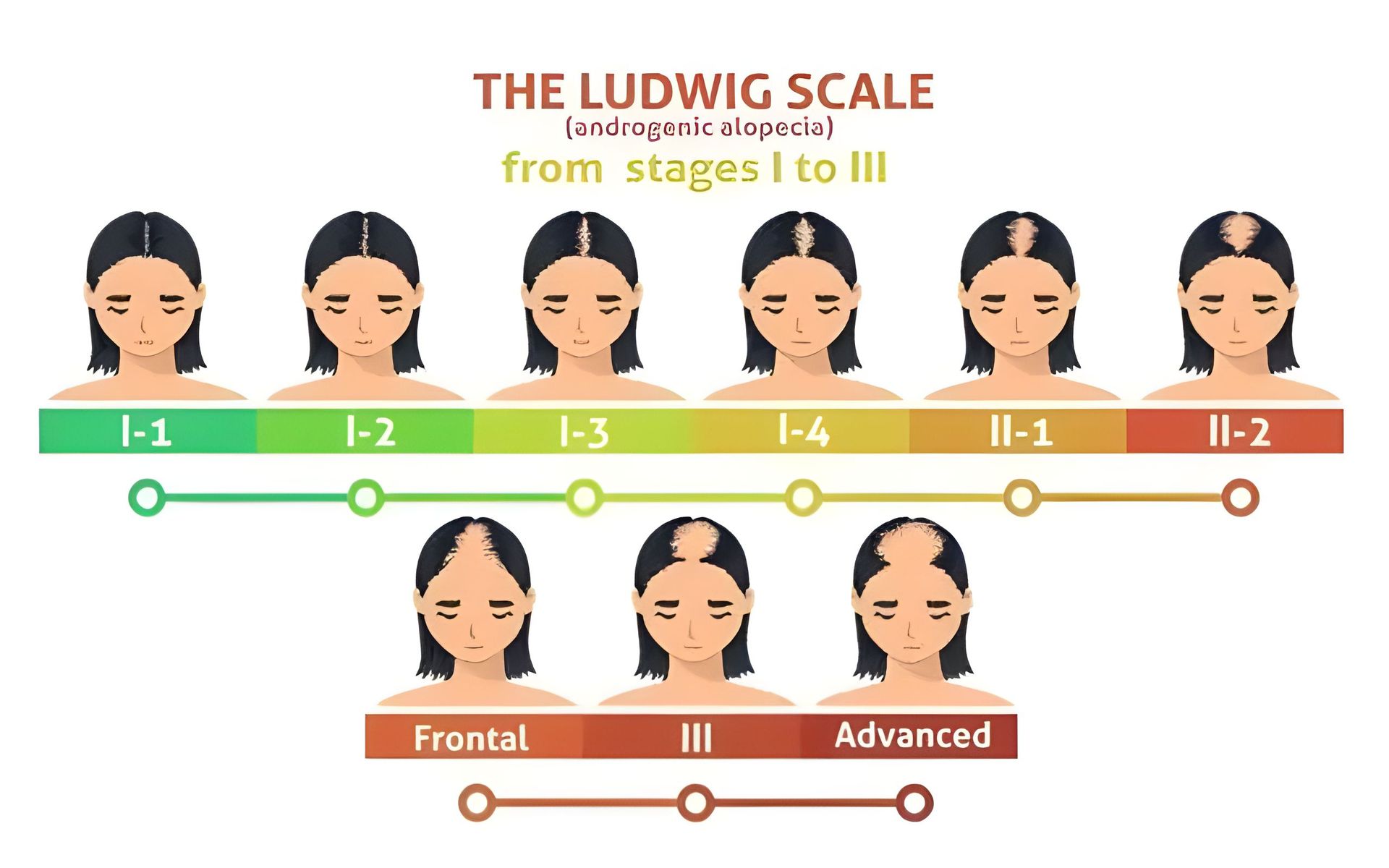
What causes female hair loss
Hair loss in females can be caused by a variety of factors. Genetic factors can play a role in hair loss, such as female pattern baldness, also known as androgenetic alopecia. This is a genetic condition that can cause hair loss and thinning on the top and front of the scalp. Hormonal changes can also cause hair loss in females. Changes in hormones due to menopause, pregnancy, childbirth, or thyroid disorders can all contribute to hair loss.
Certain medical conditions can cause hair loss in females as well. Conditions like alopecia areata, lupus, and polycystic ovary syndrome (PCOS) can all contribute to hair loss. Some medications can also cause hair loss as a side effect. Chemotherapy drugs, blood thinners, and medications used to treat acne, depression, and high blood pressure are among the drugs that can cause hair loss.
Physical or emotional stress can cause hair loss in females as well. Stressful events such as surgery, illness, or the death of a loved one can all trigger hair loss. Certain hairstyles and hair treatments can also cause hair loss in females. Tight braids, weaves, and ponytails can cause traction alopecia, a type of hair loss caused by pulling on the hair. Chemical treatments like hair dyes, perms, and relaxers can also damage the hair and cause it to fall out.
Why choose us for your female hair transplant?
There are several reasons to choose our clinic for your female hair transplant needs. Firstly, we have a team of experienced and qualified hair transplant surgeons who specialize in hair restoration for women. Our surgeons have the knowledge and expertise to design a personalized treatment plan that meets your unique needs and goals, ensuring the best possible outcome.
Secondly, we use the latest technology and techniques for female hair transplants, including Follicular Unit Extraction (FUE) and Follicular Unit Transplantation (FUT). These techniques are minimally invasive and leave minimal scarring, allowing you to achieve natural-looking results without the need for an extended recovery period.
We also understand the specific needs of women when it comes to hair restoration, including the importance of maintaining their natural hairline and avoiding the creation of an overly masculine hair pattern. Our surgeons take great care in designing a natural-looking hairline that complements your facial features and enhances your overall appearance.
Finally, we provide a supportive and compassionate environment for our patients, understanding that hair loss can be a sensitive and emotional issue. We take the time to listen to your concerns and provide guidance throughout the process, ensuring that you feel comfortable and confident in your decision to undergo a hair transplant with us.
